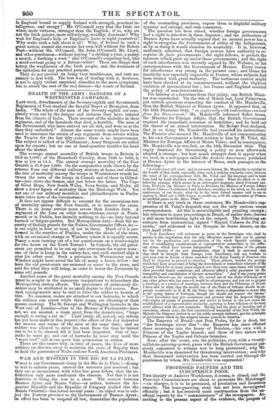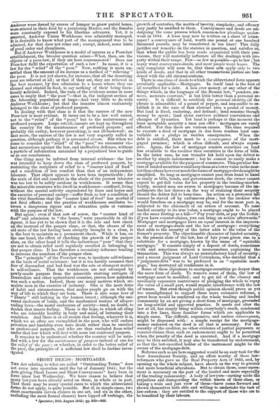PROFESSED PAUPERS AND. THE INDUSTRIOUS POOR.
TRH inquiry at Andover Workhouse, it seemsy is closed, and the Poor-law Commissioners are about to prosecute Mr. Maedougal —on charges, it is to be presumed, of peculation and licentious assaults. 'The bone-gnawing story has not been investigated officially ; but it has received some confirmation from the un- official reports by the " commissioners"- of the newspapers. Ac- cording to the present aspect of thee, evidence, the paupers of
Andover were forced by excess of hunger to gnaw putrid bones, were stinted in their food by a peculating Master, and the females were constantly exposed to his libertine advances. Yet, it is asserted, Andover Union Workhouse was admirably managed. It is desirable to know what part of the management was to be admired, for that does not come out ; except, indeed, some hints of good order and cleanliness. But if Andover Workhouse is a model of success as a Poor-law establishment, the broader question arises—What, then, are the objects of a poor-law, if they are here consummated? Does our Poor-law fulfil the expectation of such a law ? In name, it is a law for the " relief" of the " poor." Now, nothing is more un- settled than the amount of its success as a method of " relieving " the poor. It is not yet shown, for instance, that all the deserving poor are relieved at all ; or that if they are, they are relieved in the best manner, by free admission to a house where they are cleaned and stinted in food, to say nothing of their being licen- tiously solicited. Indeed, the turn of the evidence seems in most cases to imply that " the poor "—that is, the indigent section of the labouring population at large—had very little to do with Andover Workhouse ; but that the inmates almost exclusively belonged to the class of professed paupers. In dealing with that class is it that the success of the new Poor-law is most evident. It turns out to be a law well suited, not to the "relief" of the "poor," but to the maintenance of professed paupers. Large estabiLliments are kept up throughout the country for the maintenance of professed paupers ; and probably the outlay, however provoking, is not ill-bestowed : on that score, the success of the law is not very cogently called in question, although perhaps it is accounted severe. But when we come to consider the " relief" of the " poor," we encounter vio- lent accusations against the law, and ineffective defences, without a particle of information untainted by a prejudiced bias to guide us in our conclusions.
One thing may be inferred from internal evidence : the law was intended to keep down the class of professed paupers, by restricting the recipients of relief to a " coarser kind of food " and a condition of less comfort than that of an independent labourer. That object appears to have been impracticable ; for the scale of diet and comfort in the abode of the poorest labourer was too low to be safely outdone in workhouses. It seems that the miserable creatures who dwell in workhouses—confined, living -without the mental activity engendered by fears and hopes and the exercise of personal energy—suffer from so low a condition of the vital functions that the "coarser kind of food" has morbid if not fatal effects ; and the practice of workhouses oscillates be- tween a dangerous rigour and a relaxation quite at variance With the purpose of the law.
But again : even if that sort of screw, the " coarser kind of food" and admission to "the house," were practicable in all its rigour, it has yet to be shown that it is the sole and best check on the increase of the pauper class, or that, the abuses of the old state of the law having been abruptly brought to a close, it is the best to maintain as a permanent check. While it has, on the one hand, the effect of checking the growth of the pauper class, on the other hand it tells the industrious " poor " that they are not to obtain relief until regularly enrolled as belonging to that pauper class. It has therefore a secondary influence tending to increase the numbers of the pauper class.
The "principle" of the Poor-law was, to inculcate self-reliance as the basis of social existence: but it is too hastily assumed that fear of discomfort and bad food was the sole or strongest motive to self-reliance. That the workhouses are not swamped by newly-made paupers from the miserable starving cottages of Dorsetshire and other agricultural counties, proves how mistaken was such a notion. Indeed, there are many motives which sti- mulate men in the exercise of industry. One is the mere force of habit and circumstances, that makes people go on with the way of life to which they are born. There is also some love of " liberty " still lurking in the human breast ; although the uni- versal enclosure of lands, and the mechanical routine of all-per- vading laws—the moral enclosures of society—tend, no doubt, to deaden that innate feeling. There is the hope, to which all cling who are tolerably healthy in body and mind, of bettering their condition. And there is at all events that feeling, whatever it is, which we so often see exemplified in the poor, who will endure privation and hardship even unto death rather than be enrolled as professional paupers, and who are thus excluded from relief under that law which will deal with none but confessed paupers. It remains to be understood whether the country will be satis- fied with a law for the maintenance of paupers instead of one for the relief of the poor; or whether, in order to the better relief of the poor, the principles of a sufficient law shall be further inves- tigated,



























 Previous page
Previous page